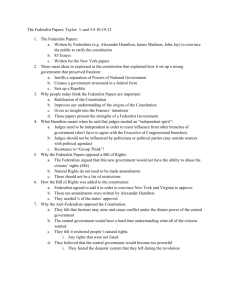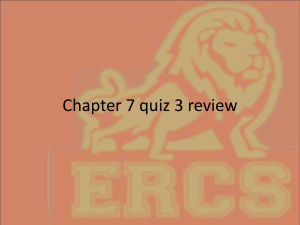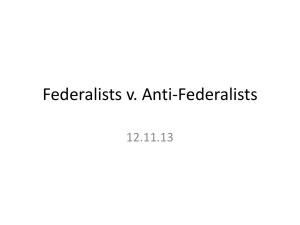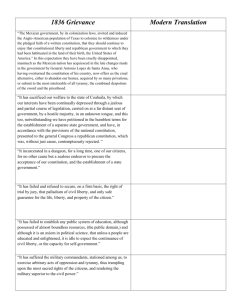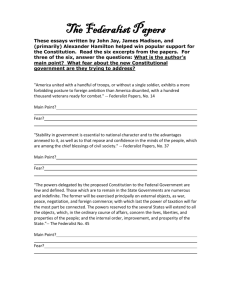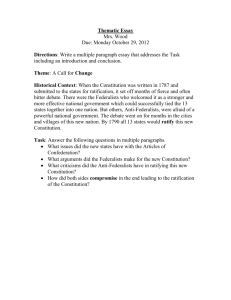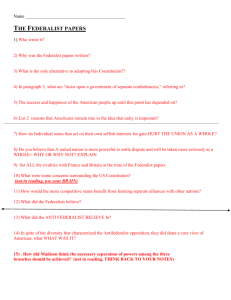Ratification of the Constitution
advertisement
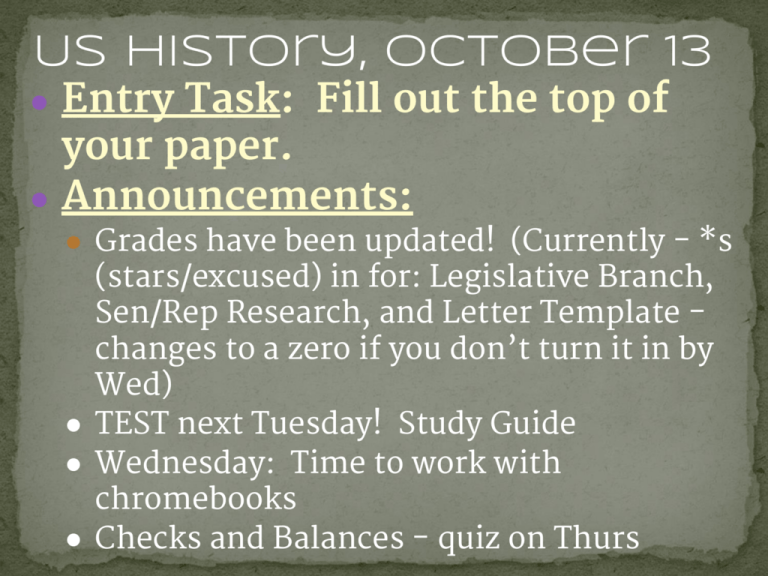
US History, October 13 ● Entry Task: Fill out the top of your paper. ● Announcements: ● Grades have been updated! (Currently - *s (stars/excused) in for: Legislative Branch, Sen/Rep Research, and Letter Template changes to a zero if you don’t turn it in by Wed) ● TEST next Tuesday! Study Guide ● Wednesday: Time to work with chromebooks ● Checks and Balances - quiz on Thurs ● REVIEW from yesterday: ● Bill of Rights - how do Supreme Court decisions impact YOU (examples)? BACK OF YOUR PAPER: Concerns of AntiFederalists (find text Ideas in the Federalist Papers 1. (find text to support ONE of these) to support ONE of these) 2. 3. 4. 1. 2. 3. 4. Amending the Constitution 2014 State laws regarding same-sex marriage in the United States1 Same-sex marriage legal Same-sex marriage performed elsewhere recognized Same-sex marriage legalization pending, but not yet in effect2 No prohibition or recognition of same-sex marriage in territory law Judicial ruling(s) overturning the same-sex marriage ban stayed indefinitely pending appeal Judicial ruling(s) overturning the ban on recognizing same-sex marriage performed elsewhere stayed indefinitely pending appeal Same-sex marriage banned contrary to federal appellate court precedent against the ban Same-sex marriage banned Millenial - Born 1980s-early 2000s Gen X - Born 1960s to early 1980s Boomers - Born 1943-1960s Silent - Born 1925-1942 TWO VIEWPOINTS ● “Today, there is widespread political activity aimed at destroying the foundations of our liberty by promoting the supremacy of the individual at the expense of social order.” ● “A government big enough to give you everything you want, is big enough to take away everything you have.” ● 9/13 states (specially elected conventions) needed to ratify the Constitution (no Bill of Rights included) ● Supporters of the Constitution began the campaign to convince the states September 1787-July 1788 ● Ratification was NOT a foregone conclusion! ● Supporters of the Constitution were called “Federalists” ● A loosely organized group called “Anti-Federalists” were against ratification ● Rejection by any of the four most prominent states-Massachusetts, New York, Pennsylvania, or Virginia would have doomed the Constitution WHAT WERE THE CONCERNS OF THE ANTI-FEDERALISTS?? - Read with your table find text to support at least ONE of the concerns we listed. ● Absence of Bill of Rights ● President would be too much like a King ● Congress would have power to tax = take property ● States’ Rights - distance of government ● Government officials = too similar to aristocracy (Example – Senators) ● Allows slavery to continue ● The Antifederalist Agrippa reminds his readers "it is the opinion of the ablest writers on the subject, that no extensive empire can be governed upon republican principles, and that such a government will degenerate to a despotism ( ___________________) unless it be made up of a confederacy of smaller states...this is precisely the principle which has hitherto preserved our freedom." ● Moreover, "the idea of ... republic, on an average, one thousand miles in length, and eight hundred in breadth, and containing six million white inhabitants all reduced to the same standard of morals or habits, and of laws, is in itself an absurdity and contrary to the whole experience of mankind." But that is the idea behind the proposed plan. ● Ought (should) not a government, vested with such extensive and indefinite authority, to have been restricted by a declaration of rights? It certainly ought. So clear a point is this, that I cannot help suspecting that persons who attempt to persuade people that such reservations were less necessary under this Constitution than under those of the States, are willfully endeavoring to deceive, and to lead you into an absolute state of vassalage (____________________). ● An Old Whig offers two arguments against the adoption of the Constitution in its present state. First, he argues that the people should never "surrender up" to government the "LIBERTY OF CONSCIENCE." (FREEDOM OF THOUGHT) ...And how will these wicked future rulers invade our essential rights of "liberty of conscience, of freedom of speech and of writing and publishing their thoughts on public matters, of trial by jury, of holding themselves, their houses and papers free from seizure and search upon general suspicion and general warrants?" How will the people be "secured in the enjoyment of life, liberty and property without depending on the will and pleasure of their rulers?" The future rulers will rely on the "unlimited power of taxation," and the presence of "a standing army." Second, he warns that the Presidency "is in reality to be a KING." Are we ready "to receive a king?" ● Absence of Bill of Rights ● President would be too much like a King ● Congress would have power to tax = take property ● States’ Rights - distance of government ● Government officials = too similar to aristocracy (Example – Senators) ● Allows slavery to continue The Federalist Papers •The Federalist Papers were a series of 85 essays written by Alexander Hamilton, James Madison and John Jay which supported the Constitution and convinced Americans that a stronger national government was needed. •Supported the Constitution and a strong central government ● The essays linked opposition to the new Constitution with hot-headed liberals (Patrick Henry) and those with a vested interest in maintaining a weak government (George Clinton). What’s so special about states’ rights??? ● Anti-Federalists believed that: ● Effective administration could only exist in small territory with homogenous population ● In large, diverse republics, differences in condition, interest, and habit are ignored for uniform administration ● A large national government would impose uniform rules despite American diversity – leads to hardship & inequity FEDERALIST PAPERS ● The authors of THE FEDERALIST Papers had varying and sometimes clashing ideas about government, but they agreed strongly on certain fundamental ideas: ● republicanism ● Federalism ● separation of powers ● free government. Federalist Paper 1--Alexander Hamilton ● …a dangerous ambition more often lurks behind the specious mask of zeal for the rights of the people than under the forbidden appearance of zeal for the firmness and efficiency of government… Federalist Paper 51--James Madison ● If men were angels, no government would be necessary. If angels were to govern men, neither external nor internal controls on government would be necessary. In framing a government which is to be administered by men over men, the great difficulty lies in this: You must first enable the government to control the governed; and in the next place, oblige it to control itself. Federalist Paper 63 – James Madison ● …There are particular moments in public affairs, when the people stimulated by some irregular passion, or some illicit advantage, or misled by the artful misrepresentations of interested men, may call for measures which they themselves will afterwards be the most ready to lament and condemn. In these critical moments, how salutary will be the interference of some temperate and respectable body of citizens, in order to check the misguided career, and to suspend the blow mediated by the people against themselves, until reason, justice and truth, can regain their authority over the public mind? Federalist Papers #69 – Alexander Hamilton ● A feeble executive implies a feeble execution of the government. A feeble execution is but another phrase for a bad execution; and a government ill executed, whatever may be its theory, must be, in practice, a bad government. ● Complaints are everywhere heard from our most considerate and virtuous citizens, equally the friends of public and private faith, and of public and personal liberty, that our governments are too unstable, that the public good is disregarded in the conflicts of rival parties, and that measures are too often decided, not according to the rules of justice and the rights of the minor party, but by the superior force of an interested and overbearing majority... ● …A zeal (___________________________) for different opinions concerning religion, concerning government, and many other points; …an attachment to different leaders ambitiously contending (___________________) for… power; or to persons of other descriptions whose fortunes have been interesting to the human passions, have, in turn, divided mankind into parties, inflamed them with mutual animosity (______________________), and rendered them much more disposed to vex and oppress each other than to co-operate for their common good… If a faction consists of less than a majority, relief is supplied by the republican principle, which enables the majority to defeat its sinister (___________________) views by regular vote… the representatives whose enlightened views and virtuous sentiments render them superior to local prejudices and schemes of injustice… TWO VIEWPOINTS ● “Today, there is widespread political activity aimed at destroying the foundations of our liberty by promoting the supremacy of the individual at the expense of social order.” ● “A government big enough to give you everything you want, is big enough to take away everything you have.” First 10 Amendments to the Constitution in 1791 Rights and freedoms won in the Revolution are preserved and protected… 1. 2. 3. 4. 5. FREEDOM of Religion, 6. Press, Speech, Assembly, Petition 7. RIGHT TO KEEP AND 8. BEAR ARMS No QUARTERING of 9. soldiers in peacetime NO UNREASONABLE SEARCH and SEIZURE 10. PROTECTION of ACCUSED RIGHT TO A SPEEDY, PUBLIC TRIAL BY JURY TRIAL BY JURY IN CIVIL SUITS NO EXCESSIVE FINES or CRUEL PUNISHMENT POWERS RESERVED TO THE PEOPLE POWERS RESERVED TO THE STATES In order for the new Constitution to become the “law of the land”, 9 of 13 states had to ratify the Constitution. 1. 2. 3. 4. 5. 6. 7. 8. 9. 10. 11. 12. 13. Delaware 30 – 0 Pennsylvania 46 – 23 New Jersey 38 – 0 Georgia 26 – 0 Connecticut 128 – 40 Massachusetts 187–168 Maryland 63 – 11 South Carolina 149 – 73 New Hampshire 57 – 47 Virginia 89 – 79 New York 30 – 27 North Carolina 194 – 77 Rhode Island 34 – 22 Hamilton & Jefferson were the most influential of the cabinet members but they had different views on the role of gov’t for the new nation Disagreements between Hamilton & Jefferson led to the 1st American political parties
